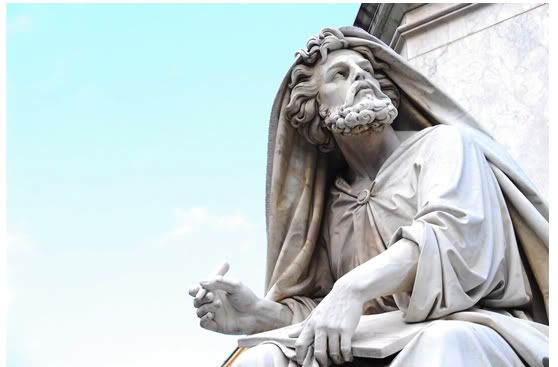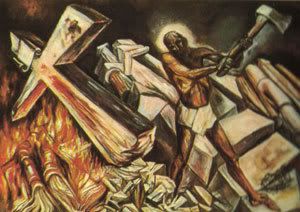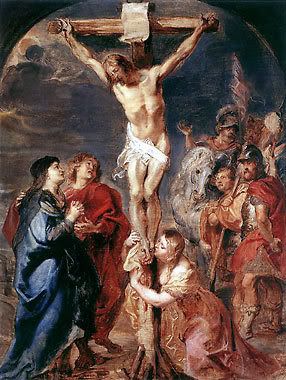
God doesn't take the side of parties. He takes the side of the poor.
This is another one where I'm going to risk losing some "followers." As I like to think of it, they are not really my followers anyway, they are either Jesus' followers or followers of their own quest for truth (not they aren't following Jesus). I"m just barrowing them for hits on the blog. I have this on my heart so I'm going to write about it. Don't worry this is not a tirad about how you should vote the way I hope you do. I'm not even going to say anything about voting or political parties.
I was posting on carm the other day, I got in an argument with a Christian, which doesn't often happen. Someone had put up a post asking "what is the Christian perspective on Capitalism and Economic Disparity." I had come across this great list of everything the Bible says about God's attitudes toward the poor, it's complied by the guy who runs world vision. I put up a thread of my own called "God takes the side of the poor." The list is really good. It's real long and give many verses. I'll give a couple on each category to show the categories and the kinds of verses.
| Blessings for those who serve the poor | Why one should not neglect serving the poor | Biblical attitudes for believers toward the poor | God's identification with the poor | What can you do?
God's heart for the poor.
Psalm 12:5 “‘Because of the oppression of the weak and the groaning of the needy, I will now arise,’ says the LORD. I will protect them from those who malign them."
Psalm 140:12 “I know that the LORD secures justice for the poor and upholds the cause of the needy.”
Isaiah 25:4 “You have been a refuge for the poor, a refuge for the needy in his distress, a shelter from the storm and a shade from the heat. For the breath of the ruthless is like a storm driving against a wall.”
Isaiah 41:17 “The poor and needy search for water, but there is none; tongues are parched with thirst. But I the LORD will answer them; I, the God of Israel, will not forsake them.”
14 passages in that section.
God's commands concerning the poor
more than 10 in that sectionDeuteronomy 15:7 “If there is a poor man among your brothers in any of the towns of the land that the LORD your God is giving you, do not be hardhearted or tightfisted toward your poor brother.”
Deuteronomy 26:12 “When you have finished setting aside a tenth of all your produce in the third year, the year of the tithe, you shall give it to the Levite, the alien, the fatherless and the widow, so that they may eat in your towns and be satisfied.”
Leviticus 19:9-10 “'When you reap the harvest of your land, do not reap to the very edges of your field or gather the gleanings of your harvest. Do not go over your vineyard a second time or pick up the grapes that have fallen. Leave them for the poor and the alien. I am the LORD your God.”
Blessings for those who serve the poor.
9 passages.Deuteronomy 15:10 “Give generously to him and do so without a grudging heart; then because of this the LORD your God will bless you in all your work and in everything you put your hand to.”
Psalm 41:1 “Blessed is he who has regard for the weak; the LORD delivers him in times of trouble.”
Proverbs 19:17 “He who is kind to the poor lends to the LORD, and he will reward him for what he has done.”
Proverbs 22:9 “A generous man will himself be blessed, for he shares his food with the poor.”
Isaiah 58:10 "And if you spend yourselves in behalf of the hungry and satisfy the needs of the oppressed, then your light will rise in the darkness, and your night will become like the noonday."
Jeremiah 7:5-7 "If you really change your ways and your actions and deal with each other justly, if you do not oppress the alien, the fatherless or the widow and do not shed innocent blood in this place, and if you do not follow other gods to your own harm, then I will let you live in this place, in the land I gave your forefathers for ever and ever."
One might also be interested in my blog piece "on Being in Need in America."
Of coure there was a brother in Christ who was offended. He laid down a bunch of coutner verses:
(Prov 10:4 NKJV) He who has a slack hand becomes poor, But the hand of the diligent makes rich.
(Prov 6:6) Go to the ant, you sluggard! Consider her ways and be wise, (7) Which, having no captain, Overseer or ruler, (8) Provides her supplies in the summer, And gathers her food in the harvest. (9) How long will you slumber, O sluggard? When will you rise from your sleep? (10) A little sleep, a little slumber, A little folding of the hands to sleep; (11) So shall your poverty come on you like a prowler, And your need like an armed man.
(Prov 12:24 NKJV) The hand of the diligent will rule, But the lazy man will be put to forced labor.
(Prov 13:4 NKJV) The soul of a lazy man desires, and has nothing; But the soul of the diligent shall be made rich.
(Prov 19:15 NKJV) Laziness casts one into a deep sleep, And an idle person will suffer hunger.
(Prov 19:24 NKJV) A lazy man buries his hand in the bowl, And will not so much as bring it to his mouth again.
(Prov 20:4 NKJV) The lazy man will not plow because of winter; He will beg during harvest and have nothing.
(Prov 20:13 NKJV) Do not love sleep, lest you come to poverty; Open your eyes, and you will be satisfied with bread.
(Prov 22:29 NKJV) Do you see a man who excels in his work? He will stand before kings; He will not stand before unknown men.
(Prov 24:30 NKJV) I went by the field of the lazy man, And by the vineyard of the man devoid of understanding; (31) And there it was, all overgrown with thorns; Its surface was covered with nettles; Its stone wall was broken down. (32) When I saw it, I considered it well; I looked on it and received instruction: (33) A little sleep, a little slumber, A little folding of the hands to rest; (34) So shall your poverty come like a prowler, And your need like an armed man.
(Eccl 10:18 NKJV) Because of laziness the building decays, And through idleness of hands the house leaks.
(1 Ki 11:28 NKJV) The man Jeroboam was a mighty man of valor; and Solomon, seeing that the young man was industrious, made him the officer over all the labor force of the house of Joseph.
The thing all of these have in common is the view that poverty is caused by laziness. If people are poor they are poor because they are lazy. Poor = lazy. Now that view may have made sense in ancient Israel, but is doesn't make much sense today. A lo of middle class want to believe it does. They have psychological motivations for believing that. They want to aswage their guilt because they have money or a job and don't help the poor they see around them. So the answer is to blame the poor, they want to be poor it's their fault.
In ancient Israel where everyone subsisted by family farms those who didn't want to work died. Those people had to work their you know what's off to survive. In modern America we have people whose lives are lied to plants and factories. When those factories close who towns can be unemployed. When that happen where do they go? If the whole twon is unemployed where do you get a job? If you don't have money to move to another place and look for a job what do you do? That's not laziness if there's no opportuntiy. Poverty has gone up in America and 1 in 10 live in poverty. Many can't meet their bills even working two jobs:
Guardian|observer
Americans have always believed that hard work will bring rewards, but vast numbers now cannot meet their bills even with two or three jobs. More than one in 10 citizens live below the poverty line, and the gap between the haves and have-nots is widening...A shocking 37 million Americans live in poverty. That is 12.7 per cent of the population - the highest percentage in the developed world. They are found from the hills of Kentucky to Detroit's streets, from the Deep South of Louisiana to the heartland of Oklahoma. Each year since 2001 their number has grown...
Under President George W Bush an extra 5.4 million have slipped below the poverty line. Yet they are not a story of the unemployed or the destitute. Most have jobs. Many have two. Amos Lumpkins has work and his children go to school. But the economy, stripped of worker benefits like healthcare, is having trouble providing good wages.
Even families with two working parents are often one slice of bad luck - a medical bill or factory closure - away from disaster. The minimum wage of $5.15 (£2.95) an hour has not risen since 1997 and, adjusted for inflation, is at its lowest since 1956. The gap between the haves and the have-nots looms wider than ever. Faced with rising poverty rates, Bush's trillion-dollar federal budget recently raised massive amounts of defence spending for the war in Iraq and slashed billions from welfare programmes.
..
Another ridiculous aspect of that stereo-type that poor = lazy is the fact that most poor people have more than one job one need not be unemployed to be starving.
CNNMoney
NEW YORK (CNN/Money) - Being poor doesn't mean being jobless, said a recent Challenger, Gray & Christmas report that found more and more working families are living at or below the poverty line.
"Poverty and hunger are rapidly becoming a workplace issue... if for no other reason than the fact that an employee who is worried about where his or her next meal will come from is not going to be very productive," said John Challenger, company CEO, in a statement.
But that's just the job placement firm's assessment. Aside from wage laws, there are no other rules telling businesses what they must give their employees.
"There is no mandate for corporations except for the minimum wage, which is set at $5.15 an hour. After that, the issue's up to the ethicists," said William Dickens, a labor economist with the Brookings Institution.
Several economists, labor activists and legal analysts also agreed that placing the welfare of American workers at the mercy of corporate largesse is dangerous for employees because of what Federal Reserve Chairman Alan Greenspan has dubbed Wall Street's "infectious greed."
I've seen some make the argument that the welfare system takes care of everyone so homeless are derelicts who want to be homeless. That's a joke. Where I live, Dallas Texas, it takes at least 2 years to get housing, and you have to qualify for it and most of that means putting money down, if you don't have the money you are out. The shelters are alarming. People get robbed and abused and they also have to be imprisoned in the shelter to stay there. You can't leave and go out in the day and look for work. You can't get welfare in Dallas without children. Single white males can't get it without being disabled. One get's just barely enough on disability to starve with a roof over your head, not much of a roof. When I was in seminary we all went down to work at soup kitchen for a day, some interned there. They told us that after six months on the street people go through mental break downs where they become unable to get out of the situation then are just trapped in a life of gutter vs abusive shelter. When these selish people see the homeless and think "they want to be homeless" it's probably becuase they have reached a point where they really can't get out of it.
When you are homeless you are a non person. Everyone thinks you were is gone. the person you were is dead. People don't regard you as human anymore, you become garbage. It's totally idiotic that a person who claims to follow the teachings of Jesus would actually think that way about people just becuase they can't make it. It's to aswage guilt.
Seek God in our hearts and let's pray will show us how he thinks about the poor. Then go be a republican. I wont tell you how to vote. Let God show what he feels about these non people who you think don't want to work.
If we want to talk about sin and equate poverty with sin, it's far more apt to be the social sins such as greed-spawned collusion, price fixing, economic trends based upon short term profits at the expense of workers, exploitation, people treated as inanimate capital in economic decision making that causes poverty rather personal initiative. Sixty Mintues showed former bank officials whose jobs it was to approve papers for foreclosure. They admitted they fabricated thousands, not hundreds, thousands of false papers thus stealing the homes of thousands of people, people who had kept up the payments and did not owe. Their homes were stolen, they have no recourse and now they are in poverty, struggling, trying to once again get back in the middle class, how many of them actually will? Are they just lazy? The system does nothing to help them.
The predictable results:The Foreclosure crisis is now spread over 2 million homes.
PBS News Hour Extra. Oct 22, 2010
Since the economic crisis began in December 2007, millions of Americans have lost their homes to foreclosure, sending families scrambling to find a place to live -- sometimes moving into relatives' houses, settling in homeless shelters or on the streets.
Confirmation on the number from real estate sourcesForeclosure, which is when a bank takes away a house because the owner cannot pay back a loan, is at the heart of the economic crisis. During the 1990s and up until 2007, banks and lenders encouraged people to buy expensive homes with loans far beyond their earnings. In some cases, lenders tricked homebuyers with payment schedules designed to start out low, but balloon after a few years.
More than 2.5 million Americans are currently at risk of losing their homes. In recent weeks there have been halts to foreclosures due to questions about paperwork and whether lenders and banks followed the rules when processing foreclosure paperwork. In Florida, activists such as Lisa Epstein have been investigating banks' fraudulent mortgage practices, including using ”robo-signers” to sign legal documents necessary to evict vulnerable homeowners.
Based on RealtyTrac data, since December 2007 (the official start of the recession) and through June 2010 there have been a total of 2.36 million U.S. properties repossessed by lenders through foreclosure (REO). In addition there have been 3.48 million default notices and 3.46 million scheduled foreclosure auctions.Thanks to action by States Attorneys general there was a temporary moratorium on the illegal house stealing. but that's back on now. Their house stealing only slacked off for a few weeks. That's just a temporary lull. The temporary stop is due to action by attorneys general. It has been found that mortgage companies were illegally foreclosing, just rushing paperwork through without any actual regard to real documentation of the house. This is nothing more than thieving. They are literally house thieves.
PBS
Bank of America, the nation’s largest bank, had stopped foreclosures as it investigated its methods, but plans to restart its foreclosure offices as early as October 25.
Illegal Foreclosures? The State investigates Three Top South Florida Law Firms....
all Business a D&B company
Publication: LexisNexis
Date: Wednesday, August 11 2010
Foreclosure mills cranking out the theft of houses. Not just in Florida. It's all 50 states:Three of Florida's largest foreclosure law firms are under investigation by the state attorney general following allegations they illegally rushed thousands of cases through the court system.
The firms, dubbed "foreclosure mills" because of the large volume they handle, are the Law Offices of Marshall C. Watson in Fort Lauderdale; Shapiro & Fishman, which has offices in Boca Raton and Tampa; and the Plantation-based firm of David J. Stern. All three handle foreclosures in Palm Beach County.
Tuesday's announcement of the investigation by the Economic Crimes Division of the attorney general's office says "thousands of final judgments of foreclosure against Florida homeowners may have been the result of the allegedly improper actions of the law firms."
Several reports have surfaced in recent months of judges throwing out foreclosure cases in which key documents, such as assignments of mortgages and notes, appear to be doctored, backdated or filed by groups with no standing to foreclose on a property.
Also, attorneys defending homeowners against foreclosure have complained the amount owed a lender on a defaulted loan sometimes cannot be substantiated.
The convoluted boom-time financial practice of repeatedly buying, selling and bundling mortgages exacerbates the situation, making it difficult sometimes to determine who is truly owed the balance of a home loan.
"On numerous occasions, allegedly fabricated documents have been presented to the courts in foreclosure actions to obtain final judgments against homeowners," the statement from Attorney General Bill McCollum says.
Action Alert
Carl C. Asbury Save My Home Lawgroup
Action Alert – Foreclosure Fraud – Tell your Attorney General “Don’t Sit Down with the Banks! Stand up Against Fraud!”
A 50-state task force investigating U.S. foreclosure practices may meet with lenders as early as this week, less than a month after JPMorgan Chase & Co. and Bank of America Corp. suspended some home seizures.
“We’ve had several conference calls with major lenders,” Colorado Attorney General John Suthers said in an interview, declining to specify which ones. “The banks want to sit down with the attorneys general. These meetings are being set up,” said Suthers, whose office is a member of the executive committee of the task force.
All 50 states on Oct. 13 announced a coordinated inquiry into whether banks and loan servicers used false documents and signatures to justify hundreds of thousands of foreclosures. The probe came after JPMorgan and Ally Financial Inc.’s GMAC mortgage unit said they would stop repossessions in 23 states where courts supervise home seizures and Bank of America froze foreclosures nationwide.
Not only have the mortgage companies been found to be actual thieves, as I thought way back when I was dealing with them, but even the people claim to have you, the knights in shining armor who are going to come to your rescue are merely vultures circling waiting end. The state of Indiana has taken actionIndiana Real estate Rama
Indiana Attorney General Greg Zoeller urges Hoosiers to avoid foreclosure rescue scams
VINCENNES, IN - October 21, 2010 - (RealEstateRama) — Many homeowners facing foreclosure who are frustrated with their loan servicers turn to for-profit foreclosure consultants whose advertisements often promise any home can be saved from foreclosure and their services are 100% guaranteed. Indiana Attorney General Greg Zoeller today announced the filing of 10 lawsuits against companies making such claims calling them false and illegal, including one complaint which was filed today in Knox County against Integrated Financial Solutions, headquartered in New Jersey.
So even the 'good guys' are the bad guys. The only good guys in it are the victims who lose their houses. No one is there to help them and even the laws are against them. The mortgage company, which is just a better organized gang of thieves, those are the one's the laws protect. The media is complicit too. look at the huge discrepancy when they talk about causes. Everyone is afraid to call it like it is. PBS attributes the crisis to lowering prices.These so-called ‘foreclosure consultants’ are taking advantage of Hoosiers who are facing desperate financial hardships and scamming them out of thousands of dollars. They are operating illegally and this will not be tolerated in Indiana,” Zoeller said. “Working to protect Hoosier consumers includes bringing actions against those who violate our state laws and also warning people to protect themselves, their family and their neighbors - don’t let a loved one fall victim to these scams, no matter how convinced they may be of their legitimacy.”
The lawsuits were filed in nine different Indiana counties by Zoeller and his team of deputy attorneys general serving in the Homeowner Protection Unit. The coordinated filing was done in an effort to raise awareness of the pitfalls of hiring for-profit foreclosure rescue companies.
PBS source above
Part of the financial crisis, however, is that the value of homes has dropped sharply. Therefore, many homeowners who pay their mortgage on time still owe more than their home is worth. For example, if you bought a house for $300,000 in 2007, your house might be worth $150,000 today. Owing more than the house is worth is called being "under water."
foreclosure data online since 2001
mortgage company propaganda
HomeOwnership.org
non profit organization
The MHA plan essentially comprises two mortgage relief programs to help troubled homeowners - a loan modification program and a refinance program.Federal Mortgage Relief - Loan Modifications
This page contains a breif description of the loan modification program. For a complete description of the qualifications and how to apply go to the Loan Modification Programs: How to Qualify and Apply page.
The purpose of a mortgage modification is to get your monthly payment to a more affordable level. An "affordable" mortgage payment is typically defined as 31% of the borrower's monthly gross income. This is achieved by modifying one or more components of your mortgage:
- Lowering the interest rate
- Extendeding the life of the loan
- Lowering the loan principle
Eligibility
There are a lot of factors that contribute to a borrower qualifying for the loan modification. Use the online qualifier provided on this website to determine how likely you are to qualify for a loan modification:
How to apply
If youre ready to begin negotiating for a loan modification, get some free advice before contacting your lender. Consider talking to a HUD-approved, nonprofit housing consultant and find out how likely you are to qualify for a loan modification based on your individual mortgage and financial situation.
What if you don't qualify or have been denied?
If you don't qualify for a loan mod or if you've been denied one in the past, there are two private programs available to you.
- The HAFA Program - Government assistance for a short sale or deed-in-lieu of foreclosure
- Safe Haven Program - For people with too much debt and monthly expenses
- Soft Landing Program - Guidance for a smooth transition out of the home
Nothing the Dems have done comes close to helping. If republicans caused it, the dems haven't cleaned it up. I'm not talking about being loyal to a party. I'm talking about chaining attitudes toward people and the system.
Don't forget the cartoon






